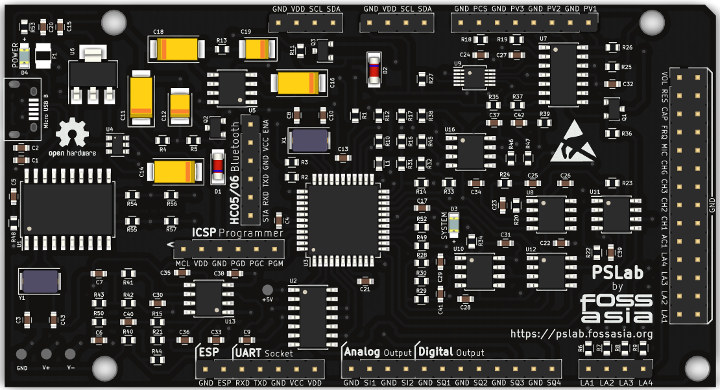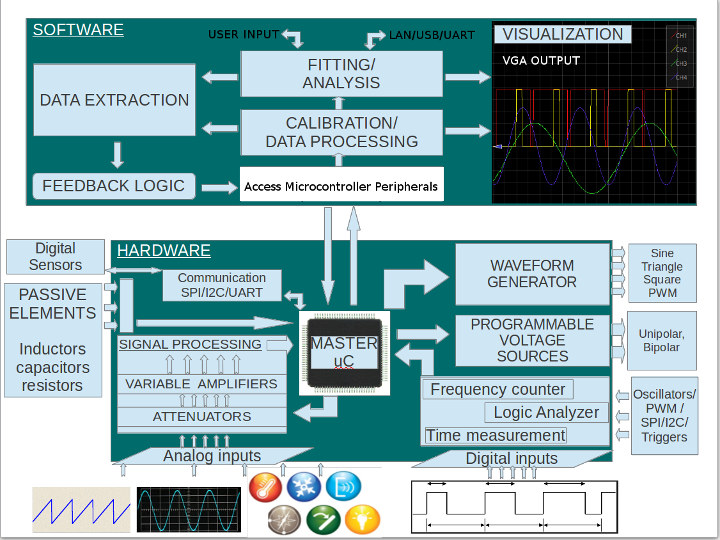Last Saturday I created a virtual schedule for the Embedded Linux Conference Europe 2018 where I listed some of the sessions relevant to myself and hopefully regular readers of CNX Software, but due to scheduling conflicts one talk did not make it to the list: “Pocket Science Lab – An Open Source Hardware for Electronics Teaching & Learning” by FOSSASIA. The project is also referred to as PSLab, and aims to “create an Open Source hardware device that can be used for experiments by teachers, students, and citizen scientists to learn and teach electronics”.
It looks interesting enough so let’s have a closer look. The project is inspired by the earlier expEYES project that combines with Raspberry Pi or other Linux platform to create an electronic labs, and the work by the Open Science Hardware community.

PSLab key features and specifications:
- MCU – Microchip PIC24EP256GP204 16-bit microcontroller @ up to 70 MHz with 32KB SRAM, 256KB flash
- Wireless Connectivity – Footprint for ESP8266 module (ESP-12E) for 802.11 b/g/n WiFi (on bottom of board)
- 4-Channel, up to 2MSPS Oscilloscope
- 12-bit Voltmeter. Programmable gain. Input ranges from +/-10mV to +/-16V
- 3x 12-bit Programmable voltage sources/ +/-3.3V,+/-5V,0-3V
- 12-bit Programmable current source. 0-3.3mA
- Supports Advanced Plugins/Add-on Modules
- 4-Channel, 4MHz, 15nS Logic Analyzer
- 2x sine wave generators. 5Hz to 5KHz. Manual amplitude control
- 4x PWM generators. 15nS resolution. Up to 8MHz
- Capacitance Measurement. pF to uF range
- I2C, SPI , UART data buses for accelerator, gyroscope, humidity sensor, etc…

Beside the hardware platform, the firmware, desktop and mobile applications to visualize the data and signals (see Android app for reference), and a Python communication library are also provided. Everything is open source from the KiCad schematics to the firmware, and programs, and released in Github under either an Apache 2.0 or GPL v3.0 license depending on the repository.
PSLab does not appear to be available for sale just yet. More details can be found in the project’s website, or if you have time for a 1-hour talk in the video below.

Jean-Luc started CNX Software in 2010 as a part-time endeavor, before quitting his job as a software engineering manager, and starting to write daily news, and reviews full time later in 2011.
Support CNX Software! Donate via cryptocurrencies, become a Patron on Patreon, or purchase goods on Amazon or Aliexpress





After finding it on F-Droid (FLOSS) android market few weeks ago, I searched a lot for an already made available version without success. All the files are available to produce the card, but searching for parts and recreate them is out of my scope. I would like to have this kind of card. I remember the big oscilloscopes, current or wave generator etc when I was student, all was very big and very expansive. That’s nice to see this kind of stuff available for everyone, at an affordable price. I hope there project will achieve great success and will help students all around the world to study electronics. Thanks for this article and for the link to expEYES that I didn’t see, and thanks a lot to the makers of this card and applications.